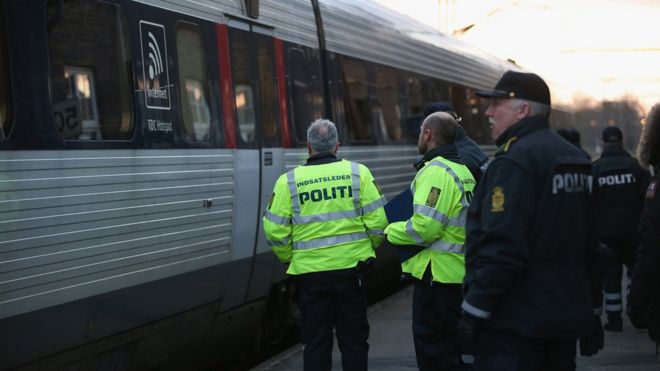
The Danish parliament will vote on
Tuesday on a highly controversial proposal to confiscate asylum seekers'
valuables to pay for their upkeep.
The proposal drew sharp criticism at home and abroad when it was announced earlier this month.Danish authorities insist the policy brings migrants in line with jobless Danes, who must sell assets above a certain level to claim benefits.
With broad cross-party support, the bill looks set to pass into law.
The government will also vote on another controversial proposal - delaying family reunifications for refugees and migrants in an attempt to discourage them from travelling to the country.
Denmark expects to receive around 20,000 asylum seekers in 2016, compared to 15,000 last year, the integration ministry told BBC News.
The country insists that the new laws are needed to stem the flow of refugees, despite both Denmark and Sweden recently tightening their borders.
Migrants feel chill of tighter borders
Europe's migrant crisis
'Misunderstood bill'
Many have compared the plan to the confiscation of valuables from Jews during the Second World War.Integration Minister Inger Stoejberg was forced to announce that no items deemed sentimental would be taken. The law would apply to cash or assets worth more than 10,000 kroner (1,340 euros, $1,450) - a figure raised from 3,000 kroner following objections.
UN refugee agency the UNHCR has warned that the proposals violate the European Convention on Human Rights, the UN Convention on the Rights of the Child, and the UN Refugee Convention.
But both the ruling centre-right Venstre party and the right-wing, anti-immigration Danish People's Party back the bill, meaning it is likely to pass.
Prime Minister Lars Lokke Rasmussen of the Venstre party has shrugged off criticism, calling the bill "the most misunderstood bill in Denmark's history".
'An impossible choice'
Once a champion of refugees' rights, Denmark's goal is now to make itself less attractive for asylum-seekers. Mr Rasmussen's party won a June 2015 election after promising an "immediate slowdown" of Denmark's refugee influx."The tone in the public debate about refugees and immigrants has undoubtedly become tougher," Kashif Ahmad, the leader of the National Party, told the AFP news agency.
Amnesty International has said war refugees would face "an impossible choice" if the waiting period to apply to bring over their family was increased from one year to three.
"Either bring children and other loved ones on dangerous, even lethal journeys, or leave them behind and face a prolonged separation," said Amnesty spokeswoman Gauri van Gulik.
Thousands of refugees and other migrants have arrived in Denmark this year, many of them in transit to Sweden, after arriving illegally by sea in southern Europe.
Several EU states said on Monday they plan to prolong temporary border controls introduced in recent months for as many as two years, in order to reduce the number of migrants entering from neighbouring nations.
The announcement came after a meeting of EU interior ministers in Amsterdam.
Where Europe is failing on migrants
- The 28 member states have not agreed on an EU-wide mechanism for relocating migrants, meant to ease the burden on Greece and Italy. Only small groups have been relocated so far - and several states in Central and Eastern Europe refuse to accept migrants
- The Schengen agreement on freedom of movement is in jeopardy - Hungary fenced off its borders with Serbia, Croatia and Slovenia; meanwhile Germany, Austria, Denmark, Sweden, Norway and France also reimposed border controls
- The Dublin regulation is not working effectively. Countries are no longer sending back migrants to their first point of entry to the EU
- Thousands of migrants - many of them Syrian war refugees - still arrive daily from Turkey
- Processing of asylum applications is slow and there is a big backlog - so reception centres are overcrowded
- Germany - the main destination for migrants - is rethinking its open-door policy, partly because of outrage over assaults on women in Cologne at New Year
BBC
YEMI


0 comments:
Post a Comment